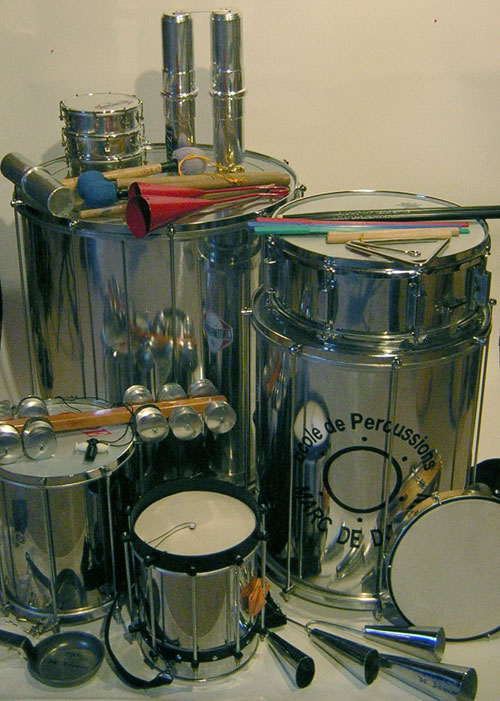
 : : : Percussions : : Brazil: the batucada
: : : Percussions : : Brazil: the batucada
The Batucada is a band composed exclusively with percussion instruments, which accompanies by walking the parade of costumed dancers and floats in the Brazilian carnivals. The "samba schools" bring together dancers, singers, costume designers, decorators, carnival queens, musicians and standard bearers, which compete at the annual parade.

European tradition originally, day (s) of "debauchery" preceding Lent, we can already see the premises in ancient Rome, where the living put masks (molding face of the corpse) of their dead, and marched through the streets to honor them one day a year, it was the "Day of the Deads". This European feast of pagan tradition has certainly viewed an echoe in the Day of the Deads ("Dia de Muertos") practiced by Native Americans, which may explain its popularity in throughout South America, Central and Caribbean. Carnival, partially "off" in Europe (with few exceptions, such as Venice, which continues a tradition coming from the Renaissance), has seen an unprecedented renewal in Brazil and especially Rio de Janeiro, therein the opportunity to "re-inject" African culture brought by exiled slaves, who had previously been "gagged" by the colonizing power.
From hence a unique and unprecedented at this level of wealth and freedom, mix of instruments and rhythms of European origin (caixa, surdo, pandeiro, etc...), African (cuica, ganza, agogo, etc...) with a true interpretation and innovation often inspired by popular recycling, appropriation of usual tools or scrap (frigideira (frying pan), apito, (whistle), shell made in empty can, etc ...). The batucada and its rhythms are just like one of the cultural and ethnic, historical and global mixes, the most successful: the mix of Brazil. This mix is found even in dancing (the "samba") and the costumes, where high heels and top hat go alongside the African steps, the Indian like parrot feathers (Amazonia), contemporaries glitter and bikinis (Brazilian invention in the era of "tan"), or the nakedness of bust (Indian and African) style started in the twenties and included in the cabaret of entire world, synonymous with feats and exoticism and encouraged by the enthusiasm of the avant-garde artists for African cultures long despised in Europe and become the source of creative renewal (notably in Paris with Josephine Baker, Picasso and his "Demoiselles d'Avignon" inspired by African masks, Modigliani, Fernand Léger, Giacometti, Stravinsky's "Rite of Spring", the arrival of jazz and Afro-Cuban music in balls, etc ...).
Today the batucada, through its accessibility to beginners, its richness and cultural universalism, is gradually gaining ground as the preferred band of all parades and outdoor events, from the football match to political demonstrations, and this, all over the world. Going through community, ethnic and social differences, batucada becomes a new vector of social cohesion, also fun and artistic, in our contemporary societies, sick of excessive individualism, consumption and property.
No other form of traditional music had appeared, offering so many different voices at the same time, interlinking in a so ingenious manner, without any voice muffling the other, combining harmoniously the neophyte and the virtuoso, the African culture and the European culture, the old and the new. The batucada is more than just a music band, it is a sociable school, a place of social and individual achievement, (almost) without competition or salary, a manifestation of the emergence of a global and contemporary aesthetic culture, which doesn't lose its geographical and temporal roots, a place of collective and living artistic creation.

Marc de Douvan, octobre 2005, translation in English: May 2013.
© 2005 Marc de Douvan Crédits Mentions légales
